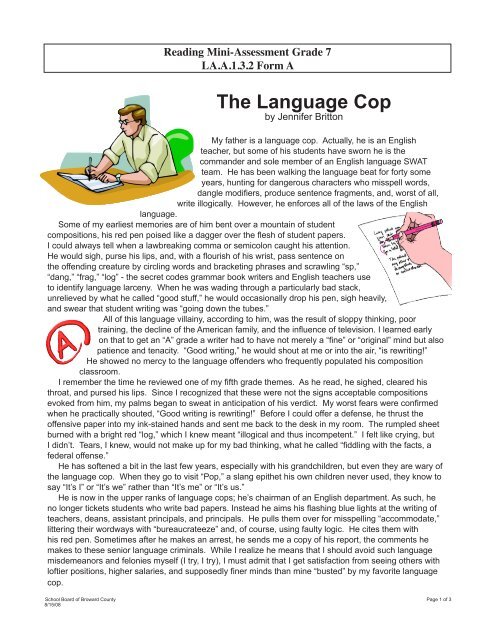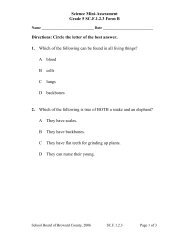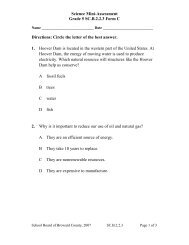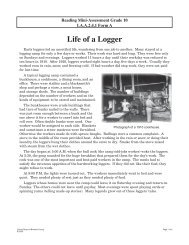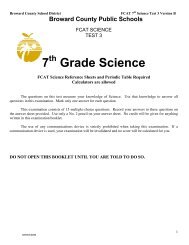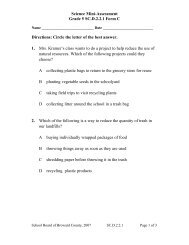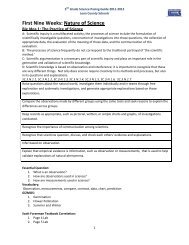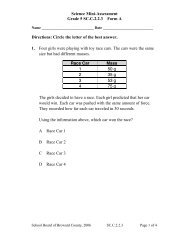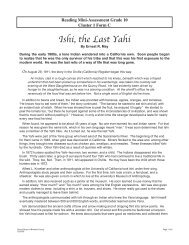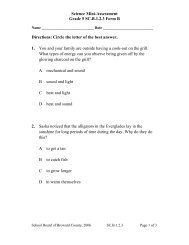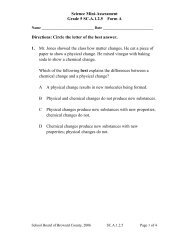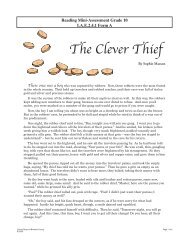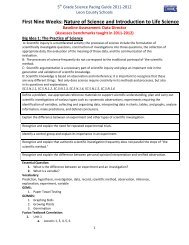The Language Cop
The Language Cop
The Language Cop
Create successful ePaper yourself
Turn your PDF publications into a flip-book with our unique Google optimized e-Paper software.
Reading Mini-Assessment Grade 7LA.A.1.3.2 Form A<strong>The</strong> <strong>Language</strong> <strong>Cop</strong>by Jennifer BrittonMy father is a language cop. Actually, he is an Englishteacher, but some of his students have sworn he is thecommander and sole member of an English language SWATteam. He has been walking the language beat for forty someyears, hunting for dangerous characters who misspell words,dangle modifiers, produce sentence fragments, and, worst of all,write illogically. However, he enforces all of the laws of the Englishlanguage.Some of my earliest memories are of him bent over a mountain of studentcompositions, his red pen poised like a dagger over the flesh of student papers.I could always tell when a lawbreaking comma or semicolon caught his attention.He would sigh, purse his lips, and, with a flourish of his wrist, pass sentence onthe offending creature by circling words and bracketing phrases and scrawling “sp,”“dang,” “frag,” “log” - the secret codes grammar book writers and English teachers useto identify language larceny. When he was wading through a particularly bad stack,unrelieved by what he called “good stuff,” he would occasionally drop his pen, sigh heavily,and swear that student writing was “going down the tubes.”All of this language villainy, according to him, was the result of sloppy thinking, poortraining, the decline of the American family, and the influence of television. I learned earlyon that to get an “A” grade a writer had to have not merely a “fine” or “original” mind but alsopatience and tenacity. “Good writing,” he would shout at me or into the air, “is rewriting!”He showed no mercy to the language offenders who frequently populated his compositionclassroom.I remember the time he reviewed one of my fifth grade themes. As he read, he sighed, cleared histhroat, and pursed his lips. Since I recognized that these were not the signs acceptable compositionsevoked from him, my palms began to sweat in anticipation of his verdict. My worst fears were confirmedwhen he practically shouted, “Good writing is rewriting!” Before I could offer a defense, he thrust theoffensive paper into my ink-stained hands and sent me back to the desk in my room. <strong>The</strong> rumpled sheetburned with a bright red “log,” which I knew meant “illogical and thus incompetent.” I felt like crying, butI didn’t. Tears, I knew, would not make up for my bad thinking, what he called “fiddling with the facts, afederal offense.”He has softened a bit in the last few years, especially with his grandchildren, but even they are wary ofthe language cop. When they go to visit “Pop,” a slang epithet his own children never used, they know tosay “It’s I” or “It’s we” rather than “It’s me” or “It’s us.”He is now in the upper ranks of language cops; he’s chairman of an English department. As such, heno longer tickets students who write bad papers. Instead he aims his flashing blue lights at the writing ofteachers, deans, assistant principals, and principals. He pulls them over for misspelling “accommodate,”littering their wordways with “bureaucrateeze” and, of course, using faulty logic. He cites them withhis red pen. Sometimes after he makes an arrest, he sends me a copy of his report, the comments hemakes to these senior language criminals. While I realize he means that I should avoid such languagemisdemeanors and felonies myself (I try, I try), I must admit that I get satisfaction from seeing others withloftier positions, higher salaries, and supposedly finer minds than mine “busted” by my favorite languagecop.School Board of Broward County Page 1 of 38/15/08
Reading Mini-Assessment Grade 7LA.A.1.3.2 Form AName __________________________________________ Date ___________________Directions: Read the article “<strong>The</strong> <strong>Language</strong> <strong>Cop</strong>,” then select the correct answer.1. Read this sentence from the article.When they go to visit “Pop,” a slang epithet his own children never used, they know to say “It’sI” or “It’s we” rather than “It’s me” or “It’s us.”What does slang epithet mean?A. a formal nameB. an informal nicknameC. a polite form of speechD. correct use of grammar2. When the teacher says that student writing “was going down the tubes” he means the writing wasA. decreasing in length.B. becoming worse.C. harder to correct.D. difficult for him to interpret.3. Which two words from the article are most nearly the same?A. evoked, poisedB. offender, criminalC. recognized, clearedD. commander, member4. How does the author organize the opening paragraph of this article?A. She lists a variety of reasons why teaching writing is important.B. She develops a list of common errors made by her father’s students.C. She makes a statement about her father and then supported it with details.D. She describes in detail what happened to the students in her father’s English class.School Board of Broward County Page 2 of 38/15/08
Reading Mini-Assessment Grade 7LA.A.1.3.2 Form AANSWER KEY – <strong>The</strong> <strong>Language</strong> <strong>Cop</strong>LA.A.1.3.2: word structure, context clues, inferences, conclusions, organizational patterns1. Read this sentence from the article.When they go to visit “Pop,” a slang epithet his own children never used, they know to say “It’sI” or “It’s we” rather than “It’s me” or “It’s us.”What does slang epithet mean?A. a formal nameB. an informal nicknameC. a polite form of speechD. correct use of grammar2. When the teacher says that student writing “was going down the tubes” he means the writing wasA. decreasing in length.B. becoming worse.Item # AnswerC. harder to correct.D. difficult for him to interpret.1. B2. B3. Which two words from the article are most nearly the same?A. evoked, poisedB. offender, criminalC. recognized, clearedD. commander, member3. B4. C4. How does the author organize the opening paragraph of this article?A. She lists a variety of reasons why teaching writing is important.B. She develops a list of common errors made by her father’s students.C. She makes a statement about her father and then supported it with details.D. She describes in detail what happened to the students in her father’s English class.School Board of Broward County Page 3 of 38/15/08


